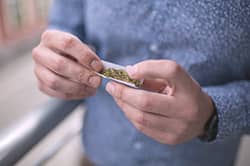Marijuana Detox Centers
 Despite their best efforts, many people experience difficulties when they try to quit using marijuana, or “weed.” Although detoxing from marijuana is not life-threatening, it can be a frustrating and uncomfortable experience. For this reason, many people may continue to abuse it as a way to alleviate withdrawal symptoms.
Despite their best efforts, many people experience difficulties when they try to quit using marijuana, or “weed.” Although detoxing from marijuana is not life-threatening, it can be a frustrating and uncomfortable experience. For this reason, many people may continue to abuse it as a way to alleviate withdrawal symptoms.
Someone who has been smoking for a long time and/or abuses other substances may benefit from treatment at a detox center or inpatient program, where they can also learn techniques to help them stop using and to prevent relapse. People with less severe addictions may also benefit from a marijuana detox program or even a less intensive outpatient treatment program.
How Long Does Marijuana Stay in Your System?
The exact amount of time that marijuana remains in your system can depend on:3,4,5
- Your weight.
- The amount you exercise.
- Your metabolic rate.
- Your level of body fat.
- The concentration of THC in the marijuana you used.
- The amount of weed you smoked.
- How frequently you used marijuana.
The U.S. National Drug Court offers the following estimates:
- An occasional or first-time user may test positive for THC on a urine test up to 4 days after last use.
- A regular user may test positive up to 10 days after last use.
- A heavy user may test positive up to 1 or 2 months after last use.
Symptoms and Timeline of Withdrawal
Some studies have reported that around 80% of heavy marijuana users experience withdrawal symptoms.1 Even though everyone experiences withdrawal differently, some of the psychological marijuana detox symptoms can include:7

- Irritability.
- Anger.
- Aggression.
- Increased anxiety.
- Nervousness.
- Feelings of depression.
Some of the physical symptoms may include:2
- Reduced appetite.
- Weight loss.
- Tremor.
- Sweating.
- Increased heart rate.
- Nausea.
- Vomiting.
- Diarrhea.
The detox timeline and the types of symptoms someone may experience can depend on a number of factors, including:
- The length of use.
- The amount of marijuana used.
- A prior history of psychiatric problems.
- Whether other substances are used.
- Overall level of physical health.
The timeline can be different for everyone. But withdrawal symptoms usually begin within 24 hours of last use. Studies indicate that the withdrawal period lasts for about a week, on average.2
Detox Programs
Detox facilities provide a number of important benefits. They can supervise detox and withdrawal and offer medical care. They can also provide medication to help you remain safe and comfortable.
Detox programs are commonly offered through standalone detox centers. A formal detoxification period may also be a component of either inpatient or outpatient rehabilitation programs, where a detox protocol is incorporated into the start of the treatment process. In addition to providing withdrawal treatment, some marijuana detox centers also offer programs for long-term recovery from addiction.
The level of care that people require depends on their level of dependence and the severity of the withdrawal symptoms they experience. People who are only mildly dependent on marijuana may seek detox services at outpatient programs, while those who have a more serious and prolonged dependence or other complicating factors may require inpatient or standalone detox center help.
Detox facilities provide a number of important benefits. They can supervise detox and withdrawal and offer medical care. They can also provide medication to help you remain safe and comfortable.
Some of the medications you may receive include:2, 9
- Trazodone to help with insomnia and other sleep difficulties.
- Buspirone to alleviate anxiety.
- Gabapentin, an antiepileptic drug that may improve sleep and brain function.
Note that the Food and Drug Administration (FDA) has not approved any medications to specifically treat cannabis dependence or withdrawal. 9
Recovery
 People often have difficulty quitting marijuana use on their own. Relapse is common and often occurs because people cannot tolerate withdrawal symptoms. One study found that among people who were abstinent for 2 weeks, 71% lapsed, or used marijuana at least once within 6 months of the abstinent period. Seventy-one percent of those who lapsed met the criteria for “relapse” by using marijuana at least 4 times in 7 days.1
People often have difficulty quitting marijuana use on their own. Relapse is common and often occurs because people cannot tolerate withdrawal symptoms. One study found that among people who were abstinent for 2 weeks, 71% lapsed, or used marijuana at least once within 6 months of the abstinent period. Seventy-one percent of those who lapsed met the criteria for “relapse” by using marijuana at least 4 times in 7 days.1
Many recovering users benefit from an immersive treatment center setting and the supportive, distraction-free environments that allow participants to fully focus on their recovery. According to the National Institute on Drug Abuse, many marijuana users, particularly teenagers, also have a psychiatric diagnosis, such as depression or anxiety, or abuse other substances in addition to weed.9 Beyond offering a trigger-free environment, detox centers for marijuana can also treat any of these co-occurring mental health concerns or substance use disorders.
Professional rehabilitation centers often include individual and group counseling sessions as part of their programs. They might use methods such as cognitive behavioral therapy (CBT), contingency management, and motivational enhancement to help users identify and overcome urges and thought patterns that might lead to drug use.9 In addition, therapy allows users to work through issues with family, friends, partners, employers, or other areas of life that may have contributed to drug abuse.
Preventing Relapse
Participating in some form of recovery aftercare can help prevent relapse after you complete a formal treatment program.10
Many people benefit from individual or group counseling to help them continue to work through issues that may have led to their addiction. Others choose to continue their recovery by attending 12-step meetings or other types of support groups, where they benefit from the camaraderie and encouragement offered by group members who have been in their shoes.
Sources
1. Haney, M. (2005). The marijuana withdrawal syndrome: Diagnosis and treatment. Current Psychiatry Reports, 7(5), 360–366.
2. Center for Substance Abuse Treatment. (2006). Detoxification and substance abuse treatment. Treatment Improvement Protocol (TIP) Series, No. 45. 4. Physical detoxification services for withdrawal from specific substances. Rockville, MD: Substance Abuse and Mental Health Services Administration.
3. NHS Choices. (2016). How long does cannabis stay in the body after smoking?
4. Huestis, M. (2007). Human cannabinoid pharmacokinetics. Chemistry and Biodiversity, 4(8), 1770–1804.
5. Columbia University: Go Ask Alice. Marijuana: How long does it hang out in the body?
6. National Institute on Drug Abuse. (2015). Want to know more? Some FAQs about marijuana.
7. Muskin, P., ed. (2014). DSM-5® self-exam questions: Test questions for the diagnostic criteria. Arlington, VA: American Psychiatric Publishing.
8. Hesse, M. and Thylstrup, B. (2013). Time-course of the DSM-5 cannabis withdrawal symptoms in poly-substance abusers. BMC Psychiatry, 13, 258.
9. National Institute on Drug Abuse. (2017). Available treatments for marijuana use disorders.
10. Hawkins, J.D. and Catalano, R.F. (1985). Aftercare in drug abuse treatment. International Journal of the Addictions, 20(6-7), 917-45.
